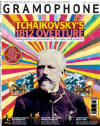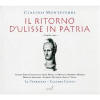Texte paru dans: / Appeared in:
*

GRAMOPHONE (08/2012)
Pour s'abonner /
Subscription information
Glossa
GCD920920

8424562209206 (ID231)
Consultez toutes les évaluations recensées pour ce cd
~~~~ Reach all the evaluations located for this CD

Reviewer: Lindsay Kemp
Cavina completes
his Monteverdi opera project
No doubt it is a commonplace to point out that Il ritorno
d’Ulisse in patria is the least popular of Montheverdi’s three surviving
full-length operas, but the lack of recordings compared to those of the much
earlier Orfeo and slightly lather L’incoronazione di Poppea
really is quite marked; the last major CD recording to be reviewed in these
pages was René Jacobs’s of 1992. Its lack of popularity probably owes much
to its perceived plainness, or at least its lack of overt colour next to
Orfeo’s richly varied textures or Poppea’s striking set-piece numbers.
The original (or rather, earliest surviving) score is very spare, showing
mostly continuo accompaniment and occasional sinfonias and ritornellos for a
group of unspecified instruments, and Jacobs (and Harnoncourt before him)
took this as an opportunity to vary the scoring, introducing recorders,
cornetts and trombones where they saw fit. Claudio Cavina is perfectly happy
to stick to single strings, though he does continue the practice of adding
extra ensemble passages here and there, as well as the odd telling
accompagnato. His continuo section of harpsichord, theorbos, harp, gamba
and lirone, furthermore, while abstaining from the crazy fantasies often
encountered today, offers a constantly shifting underscoring of the action,
whether in the halting lute phrases that intensify Penelope’s isolation or
the clomping bass-notes tat illustrate Pisandro’s clumsy wooing in Act 2.
But then this is a real ensemble performance in the best sense. Cavina and the mainly Italian singers and players of La Venexiana have already produced excellent recordings of Orfeo and Poppea, as well as all of Monteverdi’s madrigals, and are thoroughly at home in the composer’s style and mode of expression. They may not be able to boast the starry names of Christoph Prégardien, Bernarda Fink and Lorraine Hunt Lieberson, as Jacobs can off the back of his self-consciously theatrical Montpellier Opera production, but there is a unity in their performances that brings a naturalness and intimacy perfect for home listening. Not that Cavina’s singers lack anything in skill or character: Josè Maria Lo Monaco is deep, womanly and tragic as the stoic Penelope, Anicio Zorzi Giustiniani is warm and soft-toned as Ulisse, and Makoto Sakurada brings a younger-sounding, clearer focused contrast as Telemaco (though a touch more tenderness could have made his awed description of Helen properly memorable). Roberta Mameli offers bracing and crystalline tone as Minerva (but proves at least partly mortal in some slidy passaggi), and Francesca Lombardi is hard-edged, earthy, sometimes even slightly folky as Melanto. Luca Dordolo kindly refrains from overdoing it as the stuttery Iro, as do the three risible Suitors.
In fact no one here overdoes anything, and that is the recording’s strength. Monteverdi’s incredibly skilful and subtle opera, presented with honesty and stylistic and dramatic understanding by performers with nothing to prove about how well they know their business, brought together in a superbly made studio recording — this is state-of-the-art stuff, from which no one could judge the opera as plain or lacking in dept. Apparently Cavina has his sights set on Cavalli — in which case, expect an upturn in his popularity!
Cliquez l'un ou l'autre
bouton pour découvrir bien d'autres critiques de CD
Click either button for many other reviews


